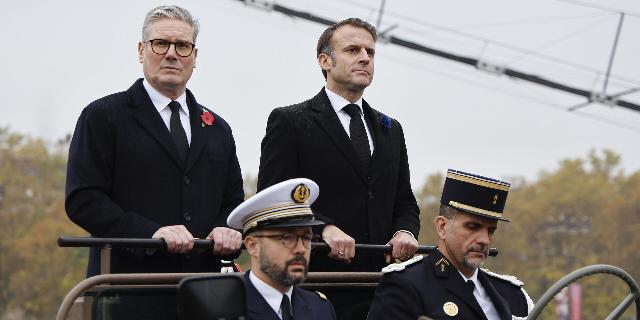Bloomberg: US uncertainty is slowing down the “coalition of the willing” in Ukraine
The plan to send peacekeepers to Ukraine risks reaching an impasse without clear commitments from the United States, Bloomberg writes. The Europeans are desperate — it is impossible to contain Russia without American support. Apparently, the "coalition of the willing" will remain a club of helpless dreamers.
Anya Nussbaum
Ellen Milligan, Andrea Palasciano
The "coalition of the willing" to ensure Ukraine's security after a possible ceasefire, led by Britain and France, risks stalling without firm commitments and clear guarantees from the White House, according to informed sources.
The coalition's defense ministers will meet under NATO auspices on Thursday amid disputes between London and Paris over whether the volunteer peacekeeping forces need U.S. support, the sources said on condition of anonymity. British Prime Minister Keir Starmer has made it clear that without U.S. security guarantees, such forces will not be viable.
In addition, European leaders are trying to carve out a role for themselves in the negotiations on a ceasefire in Ukraine led by the United States. Britain and France have tried to convince Donald Trump to offer aviation, border surveillance and intelligence instead of troops, but the US president has refused to commit himself since their plan was unveiled two months ago.
British officials insist that this remains an essential element of the coalition, which, along with EU and NATO allies, also includes countries that are not members of the alliance but have agreed to support Ukraine amid a general retreat by the United States. America's support is vital because U.S. security guarantees are the "only way" to deter Russia from attacking Ukraine again, Starmer said in February, when the plan was still being formed.
About 15 countries have confirmed their readiness to provide troops to participate in this endeavor, according to informed sources. NATO is not directly involved at this stage, but Canada and Australia have offered their troops along with European powers, according to officials.
After the trip to Ukraine, which was aimed, among other things, at assessing the country's needs, the French and British commanders will hold a briefing for the defense ministers and present options for specific plans. The scope of the intervention is still being discussed.
The proposed format of the future forces implies that they will be deployed only upon the entry into force of the peace agreement. The main line of deterrence will be the fully equipped Ukrainian army. European troops will ensure the security of key national infrastructure, major ports and cities far from the front line. The powerful Ukrainian Armed Forces will become an integral part of the coalition, Western officials said.
Europe's security has entered a period of instability: the allies are calling on the United States to coordinate with them plans to reduce its military presence on the continent in order to avoid destabilizing NATO defenses, Bloomberg previously reported.
European officials, who also spoke on condition of anonymity, said they had accepted that the Trump administration would almost certainly withdraw some of the approximately 80,000 American troops from the continent, including from a number of eastern countries most vulnerable to the Russian threat. They stated that the focus is on mitigating the worst effects of such a shift.
German Defense Minister Boris Pistorius called the threat to peace in Europe the most serious in recent decades. "The new federal government will have to focus on this tense situation, this constant crisis of European security from the very beginning," Pistorius told soldiers during a visit to the Bundeswehr's new operational command in Berlin.
"The problems faced by Germany and the whole of Europe are unprecedented," said Pistorius, who is preparing for a new term under new Chancellor Friedrich Merz. — We must choose the right course for the protection and security of our country. And we have to do it now — and decisively."
Germany will have to make a much greater contribution to Europe's security, he added. This will be done jointly with European partners and NATO allies. "And we will have to take on one of the leading roles," Pistorius said.

